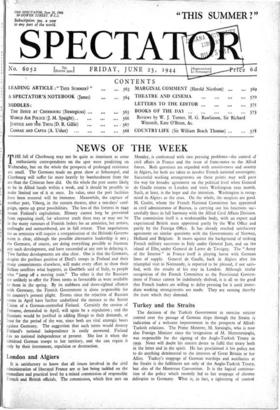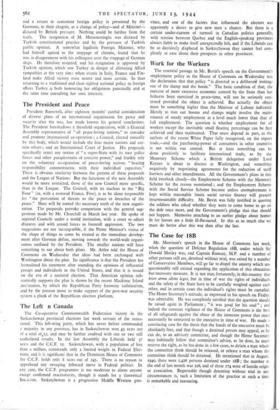Turkey and the Straits
The decision of the Turkish Government to exercise stricter control over the passage of German ships through the Straits is indication of a welcome improvement in the prospects of Allied- Turkish relations. The Prime Minister, M. Sarajoglu, who is now also Foreign Minister since the 'resignation of M. Menemenioglu, was responsible for the signing of the Anglo-Turkish Treaty in 1939. None will doubt his sincere desire to fulfil that treaty both in the letter and in the spirit. He has proclaimed it his policy not to do anything detrimental to The interests of Great Britain or her Allies. Turkey's stoppage of German warships and auxiliaries at the Straits is the fulfilment not only of the Anglo-Turkish Treaty, but also of the Montreux Convention. It is the logical continua- tion of the policy which recently led to her stoppage of chrome deliveries to Germany. What is, M fact, a tightening of control. and a return to consistent foreign policy is presented by the Germans, in their chagrin, as a change of policy—and of Minister— dictated by British pressure. Nothing could be further from the truth. The resignation of M. Menemenjoglu was dictated by Turkish constitutional practice and by the pressure of Turkish public opinion. A somewhat legalistic Foreign Minister, who had himself agreed to the stoppage of chrome, found that he was in disagreement with his colleagues over the stoppage of German ships. He therefore resigned, and his resignation is approved by Turkish opinion, which saw Turkey in danger of alienating Allied sympathies at the very time when events in Italy, France and Fin- land make Allied victory even nearer and more certain. In thus returning to a traditional and clear-sighted national policy in foreign affairs Turkey is both honouring her obligations punctually and at the same time consulting her own interests.























